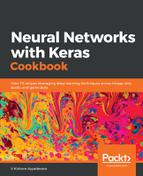Book Description
Implement neural network architectures by building them from scratch for multiple real-world applications.
Key Features
- From scratch, build multiple neural network architectures such as CNN, RNN, LSTM in Keras
- Discover tips and tricks for designing a robust neural network to solve real-world problems
- Graduate from understanding the working details of neural networks and master the art of fine-tuning them
Book Description
This book will take you from the basics of neural networks to advanced implementations of architectures using a recipe-based approach.
We will learn about how neural networks work and the impact of various hyper parameters on a network's accuracy along with leveraging neural networks for structured and unstructured data.
Later, we will learn how to classify and detect objects in images. We will also learn to use transfer learning for multiple applications, including a self-driving car using Convolutional Neural Networks.
We will generate images while leveraging GANs and also by performing image encoding. Additionally, we will perform text analysis using word vector based techniques. Later, we will use Recurrent Neural Networks and LSTM to implement chatbot and Machine Translation systems.
Finally, you will learn about transcribing images, audio, and generating captions and also use Deep Q-learning to build an agent that plays Space Invaders game.
By the end of this book, you will have developed the skills to choose and customize multiple neural network architectures for various deep learning problems you might encounter.
What you will learn
- Build multiple advanced neural network architectures from scratch
- Explore transfer learning to perform object detection and classification
- Build self-driving car applications using instance and semantic segmentation
- Understand data encoding for image, text and recommender systems
- Implement text analysis using sequence-to-sequence learning
- Leverage a combination of CNN and RNN to perform end-to-end learning
- Build agents to play games using deep Q-learning
Who this book is for
This intermediate-level book targets beginners and intermediate-level machine learning practitioners and data scientists who have just started their journey with neural networks. This book is for those who are looking for resources to help them navigate through the various neural network architectures; you'll build multiple architectures, with concomitant case studies ordered by the complexity of the problem. A basic understanding of Python programming and a familiarity with basic machine learning are all you need to get started with this book.
